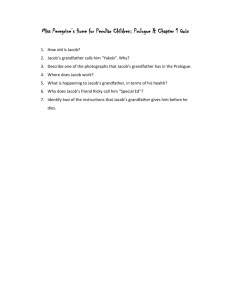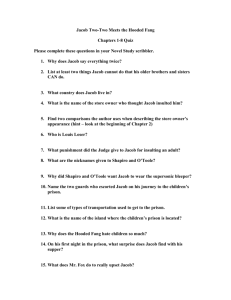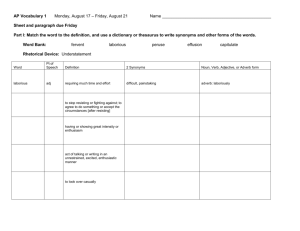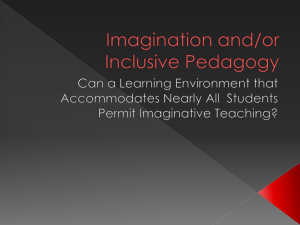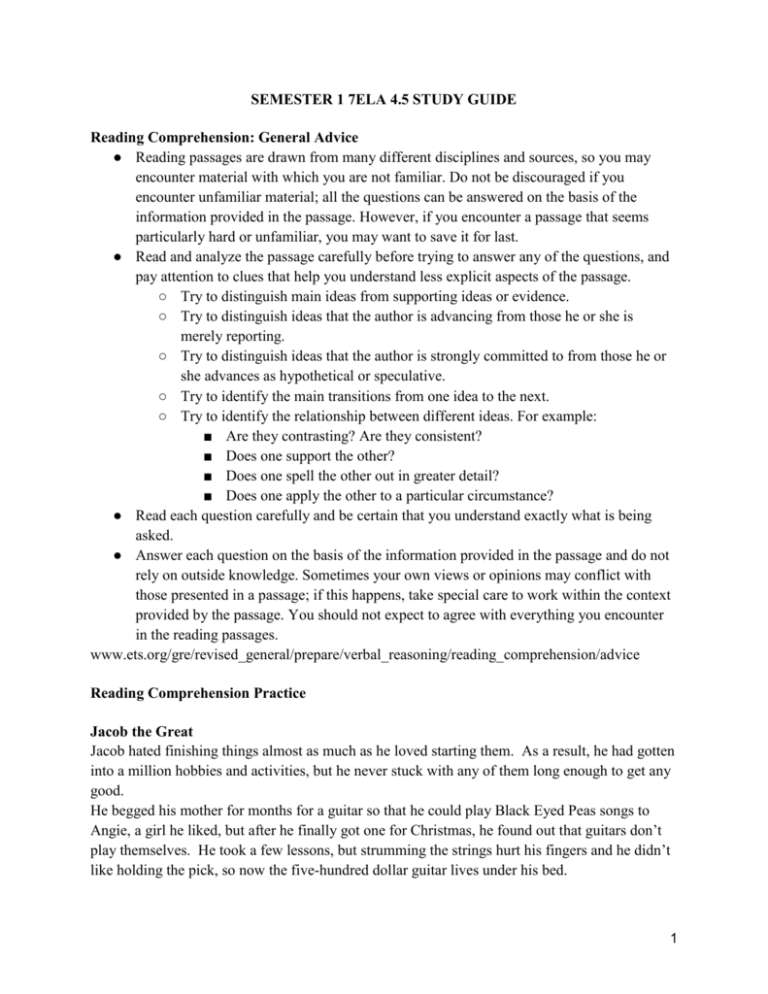
SEMESTER 1 7ELA 4.5 STUDY GUIDE
Reading Comprehension: General Advice
● Reading passages are drawn from many different disciplines and sources, so you may
encounter material with which you are not familiar. Do not be discouraged if you
encounter unfamiliar material; all the questions can be answered on the basis of the
information provided in the passage. However, if you encounter a passage that seems
particularly hard or unfamiliar, you may want to save it for last.
● Read and analyze the passage carefully before trying to answer any of the questions, and
pay attention to clues that help you understand less explicit aspects of the passage.
○ Try to distinguish main ideas from supporting ideas or evidence.
○ Try to distinguish ideas that the author is advancing from those he or she is
merely reporting.
○ Try to distinguish ideas that the author is strongly committed to from those he or
she advances as hypothetical or speculative.
○ Try to identify the main transitions from one idea to the next.
○ Try to identify the relationship between different ideas. For example:
■ Are they contrasting? Are they consistent?
■ Does one support the other?
■ Does one spell the other out in greater detail?
■ Does one apply the other to a particular circumstance?
● Read each question carefully and be certain that you understand exactly what is being
asked.
● Answer each question on the basis of the information provided in the passage and do not
rely on outside knowledge. Sometimes your own views or opinions may conflict with
those presented in a passage; if this happens, take special care to work within the context
provided by the passage. You should not expect to agree with everything you encounter
in the reading passages.
www.ets.org/gre/revised_general/prepare/verbal_reasoning/reading_comprehension/advice
Reading Comprehension Practice
Jacob the Great
Jacob hated finishing things almost as much as he loved starting them. As a result, he had gotten
into a million hobbies and activities, but he never stuck with any of them long enough to get any
good.
He begged his mother for months for a guitar so that he could play Black Eyed Peas songs to
Angie, a girl he liked, but after he finally got one for Christmas, he found out that guitars don’t
play themselves. He took a few lessons, but strumming the strings hurt his fingers and he didn’t
like holding the pick, so now the five-hundred dollar guitar lives under his bed.
1
After reading an ad in the back of one of his comic books, Jacob decided that he wanted a
Wonder-Sweeper 5000 metal detector, so that he could find buried pirate treasure. So he mowed
lawns all summer and didn’t spend his money on ice-cream like his younger brother, Alex. He
saved it all in a shoe box in his closet. Then he shoveled driveways all winter, and he didn’t
spend his money on candy and chips like his classmates. By the time spring came he had saved
$200, and he purchased the Wonder-Sweeper 5000 metal detector. He beeped it around the park
for a while, be he soon found out that no pirates had ever set sail in his neighborhood, and if they
had they didn’t leave any treasure. Even though he found a key ring, forty-seven cents, and all
the bottle caps he could throw, he buried the metal detector in his closest.
Given Jacob’s history with hobbies, it was no surprise that Jacob’s father was reluctant to buy
him a magician’s kit for his birthday. “Geez, Jacob… You sure you wouldn’t rather I got you
more guitar lessons?” He suggested. Jacob was insistent. “Dad, you’ve got to get me the
magician’s kit. This time I’ll stick with it for real. I promise! Come on, Dad,” Jacob begged.
Jacob’s father sighed and then replied, “Oh, I don’t know, Jacob. Things are awfully tight right
now.” But Jacob’s father was reminded of his own youth long ago, when he quit football and
started karate practice before hardly getting his equipment dirty. So when Jacob’s birthday came
around, Jacob was both surprised and pleased to find the magician’s kit that he had desired so
badly with a big bright bow on it.
Jacob opened up the box and unwrapped the many parts in the kit. As he did so, he imagined
sawing his pet cat in half and putting it back together to the amazement of his friends and family.
He took the many fake coins, trick cards, and rope pieces of varying length on the kitchen table
and imagined pulling rabbits out of his hat and turning them into pigeons with a mysterious puff
of smoke. As Jacob continued pulling plastic thumbs, foam balls, and giant playing cards out of
the magic kit, a commercial on the TV caught his attention. “Hey kids! Have you ever wanted to
go to space? Experience what it’s like to be an astronaut? Do you want to explore the
universe? Well, now you can.” As the commercial continued playing, Jacob walked away from
the magic kit on the kitchen table and stared at the TV screen longingly. “For only $195 you can
go to space camp and live life like an astronaut for a whole weekend. Enroll now for a once in a
life time experience.” Jacob’s cry rang throughout the house as he yelled, “MOM!” He now
knew what his true purpose in life was.
Comprehension and Inferential Questions
Directions: After reading the story, choose the best answer for each question. Circle one
answer.
1. According to the text, why does Jacob stop playing the guitar?
a. It hurt his fingers.
b. He’d rather play drums.
c. It was too easy.
d. He failed math.
2
2. To whom did Jacob want to play Black Eyed Peas songs?
a. Alex
b. Angie
d. Dad
c. Mom
3. According to the passage, why does Jacob decide that he wants a metal detector?
a. He sees a man at the park with one.
b. His father had one as a child.
c. He saw a TV commercial for one.
d. He read an ad for one in a comic book.
4. How does Jacob get the items that he wants in the story?
a. He asks his mom.
b. He asks his dad.
c. He shovels driveways and mows lawns.
d. He does all of these things to get
what he wants.
5. When did Jacob buy the metal detector?
a. In the fall
b. In the summer
d. In the winter
c. In the spring
6. True or False: The metal detector was a good investment for Jacob.
a. True
b. False
7. Why doesn’t Jacob’s father want to get him the magician’s kit for his birthday?
a. Jacob failed math class.
b. Jacob quits too many
expensive activities.
c. Jacob has been mean to his younger brother.
d. Jacob went to the park without
permission.
8. Why does Jacob’s father buy Jacob the magician’s kit?
a. Jacob mowed the lawn.
b. Jacob reminded his father
of himself.
c. Jacob bought ice cream for his brother.
d. Jacob found his father’s key ring.
9. Which word is closest in meaning to the italicized word in the following sentence from
paragraph four: “It was no surprise that Jacob’s father was reluctant to buy him a magician’s kit
for his birthday”?
a. Happy
b. Willing
c. Proud
d. Hesitant
10. What distracts Jacob from the magician’s kit?
a. A TV commercial
b. His father
d. A comic book
c. The kitchen table
3
11. Based on the end of the story, Jacob is most likely to go on and do which of the following?
a. Become a great magician
b. Learn to play guitar well
c. Detect an incredible hidden treasure
d. Raise money to go to space camp
12. Which happened first in the text?
a. Jacob asked his dad for the magician’s kit.
c. Jacob mowed lawns.
13. Which happened last in the text?
a. Jacob saved up $200.
cents in the park.
c. Jacob took guitar lessons.
b. Jacob got a guitar for Christmas.
d. Jacob shoveled driveways.
b. Jacob found forty-seven
d. Jacob was influenced by a comic book.
Four Major Types of Conflict:
By observing the manner in which a character resolves or doesn’t resolve a conflict, one
can gain insight into the character’s qualities, values, and personality. There are four main
types of conflict; there are always two sides to a conflict, which usually brings about
change. As readers, we must be aware that both sides of the conflict must be identified and
understood.
1. Character’s struggle against nature. When a character must overcome some natural
obstacle or condition, a conflict with nature occurs. For example, the men in The
Open Boat must strive to reach land or perish at sea. Floods, snowstorms, insects,
and animals may all constitute a conflict with nature. There are, however, less
obvious manifestations of nature that can also constitute a conflict, such as plague
or famine.
Also called man versus (vs.) ____________
1. Character’s struggle against an antagonist. A struggle between two people is a
common element in many works of literature. For example, in Hamlet, Hamlet is
involved in a conflict with his uncle, King Claudius, who seeks to have Hamlet
killed.
However, a conflict between two people is not always openly hostile. For example, in Crime
and Punishment, the young murderer Raskolnikov and the police investigator Porfiry
engage in a psychological conflict, a battle of wits.
Also called man versus (vs.) ____________
1. Character’s struggle against society. A struggle against society occurs when a
character is at odds with a particular social force or condition produced by society,
such as poverty, political revolution, a social convention, or set of values. For
4
example, in Nicholas Nickleby, the protagonist stands in conflict with a hypocritical
education system, while in Bleak House it is a corrupt legal system that functions as
the major antagonist.
Man Versus (vs.) ____________
1. Struggle between competing elements within the character's (internal conflict).
Within a character, aspects of his or her personality may struggle for dominance.
These aspects may be emotional, intellectual, or moral. For example, an “emotional”
conflict would occur if the protagonist chose an unworthy lover over someone who is
devoted. An “intellectual” conflict could entail accepting or rejecting one’s religion.
A “moral” conflict might pose a choice between honoring family or country. Such
conflicts typically leave the character indecisive and agitated. When such conflicts
are resolved, the resolution may be successful or unsuccessful.
Also called man versus (vs.) ____________
Conflict:
Definition (reworded): The conflict is the tension or opposition between forces in the plot
which is used to interest readers so they continue to read the story.
There are four main types of conflict:
1. Character vs. Character(s)-à if the conflict is against a person, nature, or society, then
this means the conflict is between the character and someone/something else
2. Character vs. Nature
3. Character vs. Society
4. Character vs. Self ---à this conflict means: Internal Conflict: in the character’s mind
In order to understand conflict even better, one must have a thorough understanding key
character terms.
v
Protagonist: The protagonist is the main character in a literary work. He or she is
usually seen as good, upright, respectable, and always attempting to take the proper course
of action. However, the protagonist is not always good. For example, in Wuthering
Heights, Heathcliff, a brooding and vengeful man, is the protagonist. This, the protagonist
is a central character, regardless of whether he or she is good or bad.
N. B. * Some literary works may involve an animal protagonist, such as Buck in Call of the
Wild, or the animal characters in folk tales or fables.
v
Anti-Hero: Where the protagonist is flawed, or dominated by negative traits or
questionable behavior, he or she is called an “anti-hero.” The term “snit-hero” does not,
however, mean that the central character stands in opposition to an actual hero in the story
or novel. Rather, it means that the central character stands in opposition to the traditional
idea of a hero.
v
Antagonist: The antagonist in a literary work stands in opposition to the protagonist.
In most novels, the protagonists and antagonists will be clearly distinct and remain
5
consistent. In general, the antagonist will be viewed as bad, wicked, or malicious. Even if
dominated by negative traits, however, the antagonist can be just as significant and
complex a character as the protagonist.
www.lisasclassroom.com/resources/EnglishI/FourMajorTypesofConflict.htm
Cause and Effect
Example: Many people think that they can get sick by going into cold weather improperly
dressed; however, illnesses are not caused by temperature- they are caused by germs. So while
shivering outside in the cold probably won’t strengthen your immune system, you’re more
likely to contract an illness indoors because you will have a greater exposure to germs.
In the above example, the paragraph explains how germs cause illnesses. The germs are the
cause in the paragraph and the illness is the effect.
Read the following selections, and answer the cause/effect questions.
The story of Evangeline is one of deep love and sorrow. Evangeline lived with her dad in
Nova Scotia, which is located in Canada. It was said that when war came these peaceful
people were thrown on to ships and taken from their homes. Many families were broken up
as well as many true loves. Evangeline's true love was placed on a ship that took him to the
Carolinas, and Evangeline's ship took her to New Orleans. She and her love spent many
years searching for one another. Evangeline worked as a nurse, and he was a soldier. When
he was shot in battle, he was in the hospital where she worked as a nurse. They finally met
each other again, but it was not a happy ending. He died in her arms in the hospital.
Because people were thrown onto ships,
A. Evangeline was reunited with her lost love.
B. Everybody was able to go to New Orleans.
C. Families were separated.
D. Evangeline lost contact with her parents.
6
Because Evangeline was a nurse
A. She couldn't go home.
B. She was there when her love was brought to the hospital.
C. She made a good helper.
D. She wanted to be a doctor.
What animal is about three feet long, has a twelve inch tail, and black and white fur? The
animal is terribly mean. The Tasmanian devil is a marsupial that gives birth to its babies.
The baby is placed in a pouch to grow up. It takes about fifteen to sixteen weeks for the
baby to get enough of its mother's milk to be able to leave the pouch. These ugly, mean
animals live in Australia. They sneak around at night and kill small animals. Sometimes
they eat dead animals to survive. If you run into a Tasmanian devil at night, run away!
They are not the cute cartoon pictures that you grew up with. They have sharp teeth!
The reason why the Tasmanian devil can't leave the pouch too early is because
A. It needs to be protected by its mother.
B. A cord connects the Tasmanian devil to its mother.
C. There is a strong bond between the mom and the young Tasmanian devil.
D. It needs its mother's milk.
If you see a Tasmanian devil, it is suggested you run away because
A. They are ugly.
B. They are mean.
C. They kill small animals.
D. They only hunt at night.
Autobiography & Biography
BIOGRAPHY A biography tells key facts about a person, and it is written by someone else.
It is about a real person, but is not written by the person. It is written in third person. It is
written in chronological order. The author must know a lot about the person and research
the person, so that they can write about them. A biography might talk about a person’s
achievements, things that have happened to them, and their likes and dislikes. A biography
will talk about how the person feels about different things. It might talk about the work a
person does or the things they believe in.
AUTOBIOGRAPHY An autobiography tells events in a person’s life, and it is written by
that person. It is written in first person because it contains facts about the author’s own
experiences. It is written in chronological order. An autobiography describes influences
upon the author. An autobiography describes interactions between the writer and
significant people in his or her life.
7
Autobiography or Biography? Harriet Tubman was born around 1820 in Maryland. Her
parents were slaves, so she also was a slave when she was born. She had to work even when
she was a little child. When she was twelve years old, she suffered a serious injury when an
overseer threw a heavy weight which hit her in the head. After that incident she slept a lot.
This condition remained with her the rest of her life. People with narcolepsy will suddenly
fall asleep wherever they happen to be. When she was 25, she married John Tubman who
was not a slave, but a free African American.
Autobiography or Biography? However, I became very frustrated because I couldn't talk. I
became very angry and began to throw temper tantrums. My family knew they had to do
something to help me. They found a teacher named Anne Sullivan. Miss Sullivan herself
had been blind, but had an operation and regained her sight. She understood what I was
feeling. She taught me the signs for the letters of the alphabet. Then she would "spell" the
words in my hand to communicate with her.
Prefix, Root Word, and Suffix Study Sheet
A prefix is a word part with a specific meaning at the beginning of a word.
A suffix is a word part with a specific meaning at the end of a word.
A root word is the main part of a word that contains its core meaning. Sometimes it is a word on
its own, as in unbelievable (believe is the root word), and sometimes it cannot stand alone, as in
relocation (loc is the root word). In either case, prefixes and suffixes can be added to root words,
which might change either the meaning of the word (reactivate, deactivate) or its grammatical
function (transports=present tense,
transported=past tense, transportation=noun). Sometimes spelling changes when suffixes are
added to root words (noise, noisy).
Learning root words, prefixes, and suffixes can help you because:
•If you recognize these word parts, it is easier to figure out what a word you don’t know means.
•They can help you to spell words because you’ll remember patterns.
Instructions:
As you read this paragraph, underline all words that have prefixes or suffixes. Write them below
the paragraph and then write a definition of the word. If you do not know the definition, use the
Make-a-Word Game Chart to help you guess.
The Garbage Problem
Improper garbage disposal can cause contamination of subterranean water sources. Relocating
garbage dumps doesn’t necessarily solve this incredibly unhealthful problem. Laws preceding
the discovery of this problem were predictably relaxed in terms of garbage disposal. Since the
discovery, authorities have proceeded to toughen these laws and have injected funds into
reevaluating ongoing practices. Interjection
8
of environmental organizations has helped to convince an incredulous public of the depth of the
problem and the need to recycle. Some garbage dumps have receded in size, but most have
increased as the unbelievable amount of garbage produced continues to multiply unnecessarily.
Words with prefixes or suffixes
Meaning
Supported by the Verizon Foundation
Copyright 2007 IRA/NCTE.All rights reserved.
ReadWriteThink materials may be reproduced for educational purposes.
9

